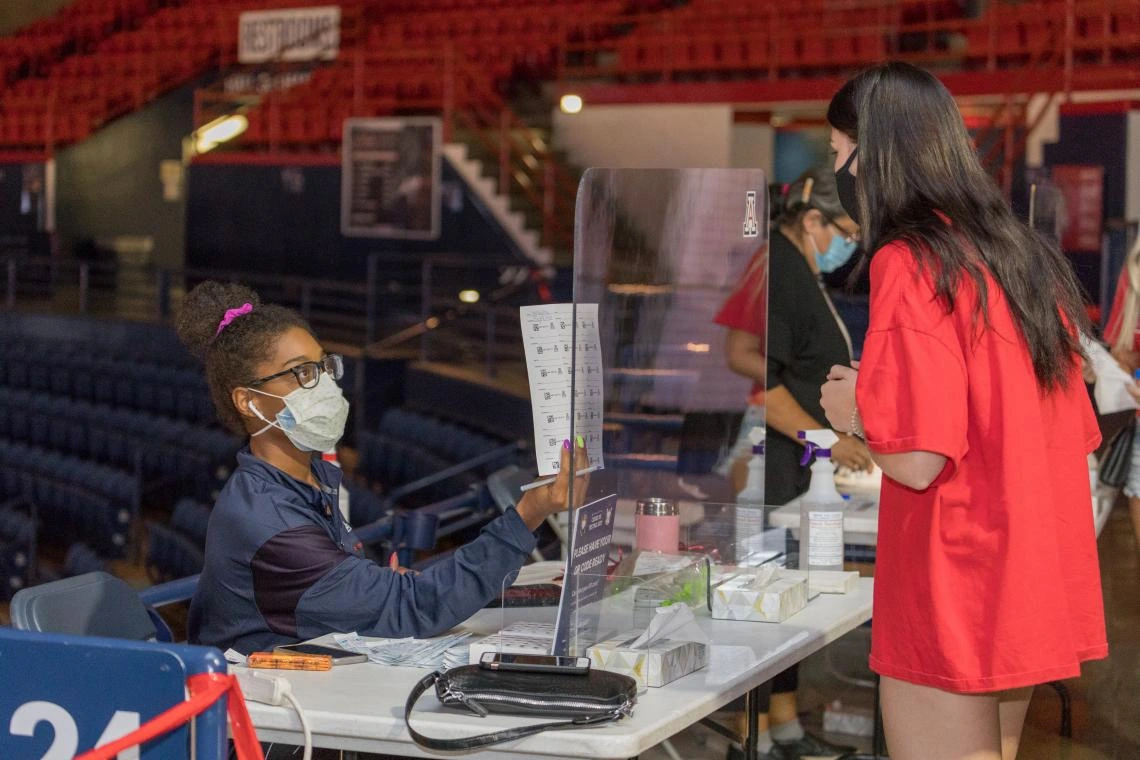Blazing a New Trail through Giving
Private gifts help university leaders implement safe campus re-entry

Supporters have given more than $750,000 to the President's COVID-19 Testing, Research and Re-entry Fund. With their help, the university is progressing through the fall 2020 semester with an on-ramp approach to instruction that depends on the Test, Trace and Treat strategy.
Alumni couple Susan and Phil Hagenah ’68 '69 are among those who have made generous gifts to support the fund.
“Dr. Robbins recognized last spring that in order to safely bring students and faculty back to campus, his administration would need to develop their own means of testing, tracing, isolating and treatment for the entire U of A community. We are proud to support his leadership in this research and planning,” they said.
Andrew and Kirsten Braccia ’98 contributed $200,000 to the effort as part of a $1.5 million gift that also benefited the UArizona College of Nursing and Arizona Athletics. Like the Hagenahs, they were motivated by President Robbins’ leadership to support COVID-19 Testing, Research and Re-entry, said University of Arizona Foundation President and CEO John-Paul Roczniak.
"The Braccias have expressed their confidence in our president's leadership at this difficult time. They're proud to be alumni of a university that's blazing this crucial trail and excited to help realize President Robbins' vision," Roczniak said.
Informing Decisions through Testing
The university is conducting tests for thousands of students and employees. The university is administering nasal swab antigen tests and Polymerase Chain Reaction, or PCR, tests, considered the gold standard for diagnosing the presence of the virus. Testing results are posted and updated daily on the university's COVID-19 website.
The university is also analyzing wastewater to help track the presence of COVID-19 in campus dorms. This effort found the presence of the virus in a dorm during the first week of classes. All residents were retested, and two were found positive and were sent to a quarantine dorm. Wastewater testing prevented an outbreak before it occurred.
University leaders aim to continue testing 1,000 members of the campus community weekly. The aggregate data from anonymized results are providing ongoing information to assess and address public health risks and make informed decisions on how to take each next step in uncharted terrain. The on-ramp plan in which larger in-person classes eventually resume depends on health indicators, including on-campus testing numbers.
Tracing Efforts
The university has launched the opt-in Covid Watch smartphone app so that campus community members can notify each other anonymously if they may have been exposed to COVID-19. After a successful pilot, the goal is for the app to be used statewide. Covid Watch is one of the first fully anonymous exposure alert apps deployed in the United States. Traditional contact tracing is also in place through the Mel & Enid Zuckerman College of Public Health.
Those who have tested positive or who are at risk are treated with wrap-around supports including modified class environments, alternative building floor plans and enhanced care through Campus Health.
Antibody Testing
In addition to tests that diagnose active infections, the university is conducting antibody testing. Leaders encourage students, faculty and staff to participate in this test as well.
This test reveals whether an individual has developed an immune response against COVID-19. The presence of COVID-19 antibodies means the immune system mounted a response against the virus, even if there were no symptoms.
Developed by Arizona Health Sciences researchers, this test is one of the most accurate in the country. It’s been in use testing Arizona’s first responders and essential workers since April 30 in partnership with the state.
Individuals who test positive for antibodies can be retested months later. Such information will help researchers better understand how long immunity to the virus persists, informing vaccine development.
Extra Info
For the latest on the University of Arizona response to the novel coronavirus, visit the university's COVID-19 website
For UANews coverage of COVID-19, visit arizona.edu/news/covid19
HELP BLAZE THE TRAIL

